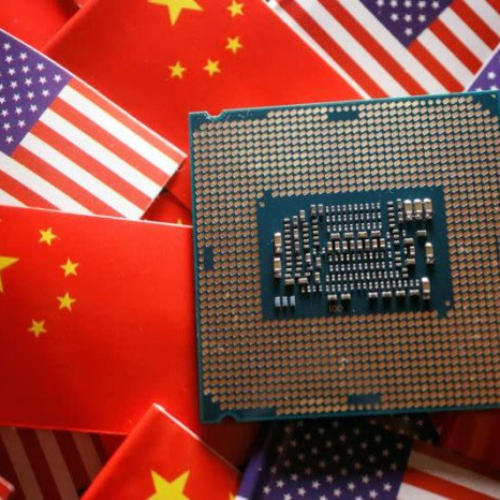The ongoing trade tension between the United States and China has been ramping up, with Beijing warning that it will retaliate if the U.S. goes ahead with new semiconductor sanctions. This dispute centers around restrictions on technology, which are a critical part of both countries’ economies and global influence.
The U.S. Moves Against China
The U.S. government is preparing to expand its restrictions on Chinese companies involved in semiconductor manufacturing. The U.S. has already put several Chinese firms on its “Entity List,” which limits their access to American technology and products. Now, there are reports that the U.S. plans to add more than 200 Chinese companies to this list. The new rules would stop American companies from selling semiconductor chips and related equipment to these Chinese firms, making it harder for them to grow their tech industries.
These actions come as part of the U.S. strategy to stop China from becoming a stronger player in high-tech industries like semiconductors. Many in the U.S. government see China’s growing ability to make advanced chips as a national security threat, fearing that China could use this technology for military purposes or to challenge the U.S.’s global tech leadership.
China’s Threat to Respond
China is not taking these new sanctions lightly. Officials from China’s Ministry of Commerce have warned that the country will take strong retaliatory measures if the U.S. moves forward with the sanctions. They made it clear that China is prepared to fight back, and this threat could mean serious consequences for the global tech market.
One of the ways China could respond is by restricting exports of materials used in making semiconductors. China is a major supplier of certain key materials, like germanium and dysprosium, which are essential in creating chips. If China stops exporting these materials, it could cause a major disruption for U.S. and other countries’ tech industries, as they depend on these materials for production.
This kind of response could make it harder for American companies to create high-tech products, slowing down their technological progress. It could also give Chinese companies more time to improve their own semiconductor technology, potentially allowing them to catch up with their U.S. competitors.
China Semiconductor Sanctions Spark Economic Challenges for Asian Firms
Impact on U.S. Companies and Global Tech
The potential new sanctions are already causing concern within the U.S. business community. U.S. companies that sell chips and semiconductor equipment to China have warned that the new restrictions could hurt their profits. China is an important market for these businesses, and losing access to it could cause significant financial losses.
The U.S. Chamber of Commerce has also expressed concerns about the sanctions, saying that they could harm the U.S. economy in the long run. The Chamber has been working to alert businesses about the potential impact of the new rules. This shows that not everyone in the U.S. government agrees with the tough stance against China, as there are fears about the broader consequences.
At the same time, there is growing pressure in China to develop its own semiconductor technology and reduce reliance on foreign manufacturers. Chinese companies like SMIC (Semiconductor Manufacturing International Corporation) are working to build their own advanced chip-making machines. However, they face a big challenge: China does not yet have access to the most advanced semiconductor manufacturing technology, particularly the EUV (Extreme Ultraviolet) machines needed to make smaller, more efficient chips. Without this equipment, China’s chip makers might struggle to compete with American companies that already have access to the latest technology.
This situation puts Chinese companies in a difficult spot, as they need the technology from the U.S. and other countries to stay competitive. But with the U.S. restricting technology sales to China, these companies might find it harder to catch up with the West.
Growing Tensions
The tensions over semiconductor technology are just one part of a larger struggle between the U.S. and China. Both countries are competing for dominance in high-tech industries, and semiconductors are seen as one of the most important areas of this competition. As the U.S. continues to limit China’s access to advanced technology, Beijing is likely to keep finding ways to push back. This escalating fight over chips shows just how crucial technology has become in global politics and the economy.
The semiconductor industry is at the heart of this dispute, with both countries realizing that whoever controls this technology will have a significant advantage in the future. The sanctions and potential retaliations could have far-reaching effects, not just for tech companies, but for everyday consumers who depend on these technologies in their phones, computers, and other devices.


